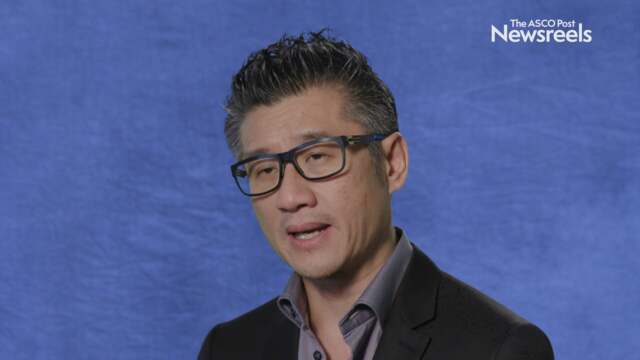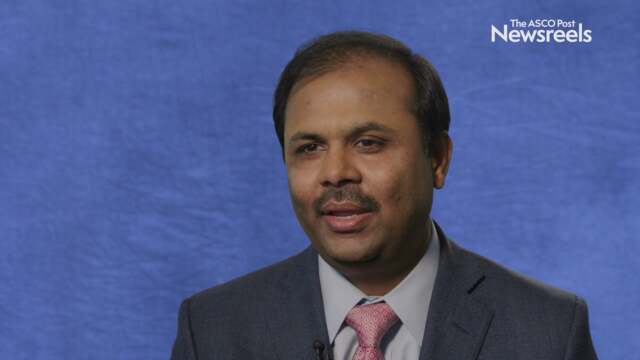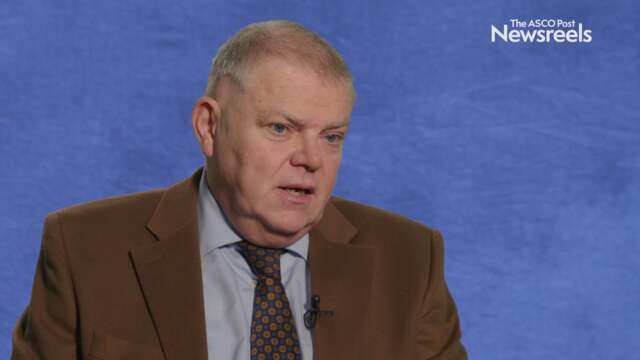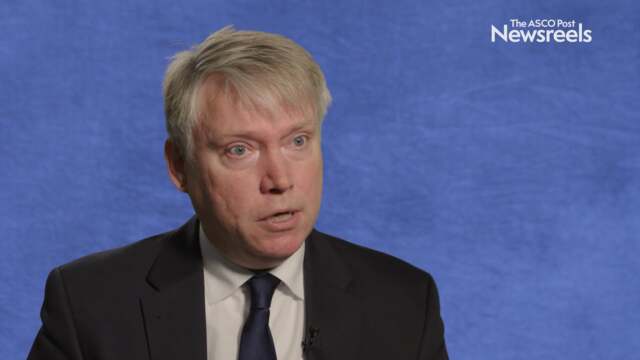FDA Approves Lorlatinib for Second- or Third-Line Treatment of ALK-Positive Metastatic NSCLC
On November 2, 2018, the U.S. Food and Drug Administration granted accelerated approval to lorlatinib (Lorbrena) for patients with anaplastic lymphoma kinase (ALK)-positive metastatic non–small cell lung cancer (NSCLC) whose disease has progressed on crizotinib (Xalkori) and at least one other ALK ...
Lorlatinib Shows Overall and Intracranial Activity in ALK-Positive NSCLC
In a global phase II study reported in The Lancet Oncology, Solomon et al found that lorlatinib (Lorbrena) showed high overall and intracranial activity in patients with advanced ALK-positive non–small cell lung cancer (NSCLC) who were treatment-naive or who had received crizotinib (Xalkori)...
Lung Cancer Screening: Proven Effective but Still Fighting for Acceptance
In 2010, the long-awaited findings from the National Lung Screening Trial (NLST) revealed that participants who received low-dose helical computed tomography (CT) scans had a 15% to 20% lower risk of dying of lung cancer than participants who received standard chest x-rays. In response, the U.S....
CONVERT Trial: Concurrent Chemoradiotherapy to Treat Elderly Patients With Limited-Stage SCLC
Elderly patients with limited-stage small cell lung cancer (SCLC) showed similar survival and toxicity compared to younger patients when treated with concurrent chemoradiotherapy. These study findings were published by Christodoulou et al in the Journal of Thoracic Oncology. SCLC constitutes ...
Corticosteroids and Immunotherapy: Guilty or Guilt By Association?
FIRST-LINE TREATMENT options for advanced non–small cell lung cancer (NSCLC) include single- agent immunotherapy for patients with a programmed cell death ligand 1 (PD-L1) tumor proportion score of at least 50% or in combination with chemotherapy in unselected patients.1-3 Single immunotherapy is...
Corticosteroid Use at Start of PD-1/PD-L1 Inhibitor Therapy Affects Outcomes in NSCLC
IN A STUDY reported in the Journal of Clinical Oncology, Kathryn C. Arbour, MD, of Memorial Sloan Kettering Cancer Center, and colleagues found that baseline treatment with corticosteroids was associated with poorer efficacy of programmed cell death protein 1/programmed cell death ligand 1...
Atezolizumab Plus Chemotherapy Improves Outcomes in Small Cell Lung Cancer
ATEZOLIZUMAB (TECENTRIQ), an anti–program cell death ligand 1 (PD-L1) antibody, combined with carboplatin/ etoposide as first-line treatment for extensive-stage small-cell lung cancer (SCLC) improved overall and progression-free survival and may represent a new standard of care, according to...
Adding the Patient’s Voice to Collaborative Clinical Trial Efforts
THE INTERNATIONAL Association for the Study of Lung Cancer (IASLC) 19th World Conference on Lung Cancer was the largest in its history. One of the key themes of the meeting was to focus on the patient. Here are highlights of presentations from this conference that demonstrate the role of the...
Expert Point of View: Fiona Blackhall, MD, PhD
FORMAL STUDY discussant, Fiona Blackhall, MD, PhD, of the University of Manchester, UK, welcomed brigatinib (Alunbrig) as a new first-line option for ALK-positive patients but said, “In the absence of comparisons of next-generation ALK inhibitors, it will take some time to determine if there is...
Brigatinib Improves Outcomes Over Crizotinib in ALK-Positive Non–Small Cell Lung Cancer
THE FIRST-LINE USE of brigatinib (Alunbrig) was superior to standard-of-care crizotinib (Xalkori) in patients with advanced anaplastic lymphoma kinase (ALK)-positive non–small cell lung cancer (NSCLC), according to the first report of the phase III ALTA-1L trial presented at the International...
Increased Survival in Patients With Metastatic NSCLC Receiving Treatment in Academic vs Community Centers
Patients with metastatic non–small cell lung cancer (NSCLC) receiving treatment at academic centers have an increased 2-year survival compared to patients treated at community-based centers, according to findings published by Ramalingam et al in the Journal of Thoracic Oncology. An...
IASLC Issues Statement on Lung Cancer Screening With Low-Dose Computed Tomography
The International Association for the Study of Lung Cancer (IASLC) recently issued a statement on lung cancer screening with low-dose computed tomography (CT) based on the results of the Dutch-Belgian NELSON lung cancer screening trial presented at the IASLC 19th World Conference on Lung Cancer...
Actively Recruiting Clinical Trials Focused on Immunotherapies for Lung Cancer
The information contained in this Clinical Trials Resource Guide includes actively recruiting clinical studies focused on immunotherapies in lung cancer. These trials are studying combination therapies, radiotherapy plus immunotherapy, cancer vaccines, identifying biomarkers to immunotherapy...
FDA Approves Lorlatinib for Second- or Third-Line Treatment of ALK-Positive Metastatic NSCLC
On November 2, 2018, the U.S. Food and Drug Administration granted accelerated approval to lorlatinib (Lorbrena) for patients with anaplastic lymphoma kinase (ALK)–positive metastatic non–small cell lung cancer (NSCLC) whose disease has progressed on crizotinib (Xalkori) and at least...
ESMO 2018: CTONG 1103 Finds Benefit With Neoadjuvant Erlotinib in Some EGFR-Mutated NSCLCs
Neoadjuvant erlotinib (Tarceva) benefits selected patients with epidermal growth factor receptor (EGFR)-mutated non–small cell lung cancer (NSCLC) who undergo complete resection of stage IIIA-N2 disease, according to a randomized study comparing erlotinib with gemcitabine plus cisplatin as...
FDA Approves Pembrolizumab in Combination With Chemotherapy for First-Line Treatment of Metastatic Squamous NSCLC
On October 30, 2018, the U.S. Food and Drug Administration (FDA) approved pembrolizumab (Keytruda) in combination with carboplatin and either paclitaxel or nanoparticle albumin-bound (nab)-paclitaxel (Abraxane) as first-line treatment of metastatic squamous non–small cell lung...
IASLC Issues Statement on Lung Cancer Screening With Low-Dose Computed Tomography
The International Association for the Study of Lung Cancer (IASLC) recently issued a statement on lung cancer screening with low-dose computed tomography (CT) based on the results of the Dutch-Belgian NELSON lung cancer screening trial presented at the IASLC 19th World Conference on Lung Cancer...
2018 ASTRO: Overall Survival With Local Consolidative Therapy in Oligometastatic NSCLC
Adding radiation therapy or surgery to systemic therapy for patients with stage IV lung cancer whose cancer has spread to a limited number of sites can significantly extend overall survival, according to new results from a multicenter, randomized, controlled phase II study. The findings were...
David Raben, MD, on NSCLC: Results From the PACIFIC Trial
David Raben, MD, of the University of Colorado, discusses overall survival with durvalumab vs placebo after chemoradiotherapy in stage III non–small cell lung cancer (Abstract LBA10).
Daniel R. Gomez, MD, on NSCLC: Findings From a Phase II Treatment Trial
Daniel R. Gomez, MD, of The University of Texas MD Anderson Cancer Center, discusses the final results of a phase II study on local consolidative therapy, which improved overall survival compared with maintenance therapy and observation in oligometastatic non–small cell lung cancer (Abstract LBA3).
Tony Mok, MD, on NSCLC: Targeted Treatment Update
Tony Mok, MD, of the Chinese University of Hong Kong, discusses two important studies in non–small cell lung cancer: FLAURA, which looked at the first-line activity of osimertinib and the mechanisms of resistance; and ALESIA, which examined crizotinib dosing.
Suresh S. Ramalingam, MD, on Lung Cancer: Research Highlights
Suresh S. Ramalingam, MD, of the Emory University School of Medicine, summarizes the top-line lung cancer results reported at this year’s ESMO Congress, including the role of targeted treatment for early stage NSCLC, combining immunotherapy for surgically resectable disease, and immunotherapy for small–cell lung cancer as well as unresectable NSCLC.
Activity of Antibody-Drug Conjugate Telisotuzumab Vedotin in c-Met–Positive Advanced NSCLC
In a phase I study reported in the Journal of Clinical Oncology, Strickler et al found evidence of activity of the antibody-drug conjugate telisotuzumab vedotin in non–small cell lung cancer (NSCLC) overexpressing c-Met. The agent combines the anti–c-Met monoclonal antibody...
Johan F. Vansteenkiste, MD, PhD, on NSCLC: Immunotherapy and Targeted Treatments
Johan F. Vansteenkiste, MD, PhD, of Catholic University Leuven, summarizes a session he co-chaired that included discussion of translating advances in stage IV disease to nonmetastatic lung cancer, TKI approaches in early-stage disease, and integrating immunotherapy and TKIs in stage III disease management.
Martin Reck, MD, PhD, on Immunotherapy for Thoracic Malignancies: Expert Perspective
Martin Reck, MD, PhD, of the LungenClinic, discusses recent updates on biomarkers beyond PD-L1 expression; mechanisms and management of resistance; as well as combinations and novel approaches in lung cancer.
Regardless of Taxane Used, Pembrolizumab Plus Chemotherapy Improves Survival in Squamous NSCLC
The addition of pembrolizumab (Keytruda) to a standard platinum doublet as first-line therapy improved overall and progression-free survival in patients with metastatic squamous non–small cell lung cancer (NSCLC), in the primary analysis of KEYNOTE-407.1,2 Furthermore, it did not seem to matter...
Entrectinib Shows Activity in ROS1-Positive NSCLC
Although ROS1-mutated lung cancer accounts for about 1% to 2% of all non–small cell lung cancers (NSCLCs), it is an important druggable oncogene, and new data show that it can be successfully targeted for clinical gain. In a pooled analysis of phase I and II trials in patients with ROS1-positive...
NELSON Trial: ‘Call to Action’ for Lung Cancer CT Screening of High-Risk Individuals
Results of the very large, randomized, population-based NELSON trial confirm the value of low-dose computed tomography (CT) screening in people at high risk for developing lung cancer. The protective value of screening was more pronounced in women than in men. These study findings were presented at ...
Durvalumab Improves Overall Survival in Unresectable Stage III NSCLC
Several lung cancer trials have shown prolonged progression-free survival with checkpoint inhibitor therapy. For the first time, the phase III PACIFIC trial has found an overall survival benefit for the selective programmed cell death ligand 1 (PD-L1) checkpoint inhibitor durvalumab (Imfinzi) vs...
Atezolizumab Plus Standard Chemotherapy Improves Progression-Free Survival in Stage IV NSCLC
The combination of atezolizumab (Tecentriq), a programmed cell death ligand 1 (PD-L1) inhibitor, plus carboplatin or cisplatin and pemetrexed (Alimta) as first-line therapy followed by pemetrexed plus atezolizumab maintenance therapy improved progression-free survival in patients with stage IV...
ICU Admissions During Terminal Hospitalizations in Patients With Stage IV Lung Cancer
In a study reported in the Journal of Oncology Practice, Mrad et al found an increase in the proportion of patients with stage IV lung cancer admitted to the intensive care unit (ICU) during terminal hospitalization between 1998 and 2014. A large increase in palliative care contacts also occurred,...
Opioid Use Following Video-Assisted Thoracoscopic Surgery or Open Resection in Early-Stage Lung Cancer
In a study reported in a research letter in JAMA Oncology, Tuminello et al found that video-assisted thorascopic surgery (VATS) was less likely than open resection to be associated with long-term opioid use in patients undergoing surgery for early-stage lung cancer. Study Details The study...
KEYNOTE-407: First-Line Pembrolizumab Plus Chemotherapy in Metastatic Squamous NSCLC
As reported at the recent International Association for the Study of Lung Cancer 19th World Conference on Lung Cancer and in The New England Journal of Medicine by Paz-Ares et al, the phase III KEYNOTE-407 trial has shown that the addition of pembrolizumab to platinum-based chemotherapy...
CHEST 2018: Adherence to Annual Lung Cancer Screening Needs Improvement
A study from the Thoracic Oncology Research Group (TORG), Division of Pulmonary Critical Care, Medical University of South Carolina, aimed to examine the adherence to annual low-dose computed tomography (LDCT) screening after baseline LDCT within the Veteran Health Administration Lung Cancer...
FDA Approves Dacomitinib for Metastatic Non–Small Cell Lung Cancer
ON SEPTEMBER 27, 2018, the U.S. Food and Drug Administration (FDA) approved dacomitinib tablets (Vizimpro) for the first-line treatment of patients with metastatic non–small cell lung cancer (NSCLC) with epidermal growth factor receptor (EGFR) exon 19 deletion or exon 21 L858R substitution...
Atezolizumab Plus Chemotherapy in Previously Untreated Extensive-Stage Small Cell Lung Cancer
As reported at the recent International Association for the Study of Lung Cancer 19th World Conference on Lung Cancer and in The New England Journal of Medicine by Horn et al, the phase III IMpower133 study has shown significant improvement in overall and progression-free survival with...
No Survival Benefit With Avelumab vs Docetaxel in Platinum-Treated, Advanced, PD-L1–Positive NSCLC
As reported in The Lancet Oncology by Barlesi et al, the phase III JAVELIN Lung 200 trial has shown no overall survival benefit with avelumab (Bavencio) vs docetaxel in patients with platinum pretreated programmed cell death ligand 1 (PD-L1)–positive advanced non–small cell lung cancer...
Study Shows Invasive Lung Cancer Surgery Can Lead to Long-Term Opioid Use
Patients treated with more invasive surgical techniques for early-stage non–small cell lung cancer (NSCLC) are more likely to become chronic opioid users than patients treated with minimally invasive surgery, highlighting the need for additional research into how pain management after surgery ...
Osimertinib in First-Line Treatment of EGFR-Mutant Metastatic NSCLC
In the Clinic provides overviews of novel oncology agents, addressing indications, mechanisms of action, administration recommendations, safety profiles, and other essential information needed for the appropriate clinical use of these drugs. In April 2018, osimertinib (Tagrisso) was approved for...
Durvalumab Improves Overall Survival in Stage III NSCLC
The phase III PACIFIC trial showed significantly improved overall survival with durvalumab (Imfinzi) vs placebo after chemoradiotherapy in patients with unresectable stage III non–small cell lung cancer (NSCLC). Scott J. Antonia, MD, of the Moffitt Cancer Center, Tampa, Florida, reported these...
Thermal Ablation vs Stereotactic Radiotherapy in Early-Stage NSCLC
Thermal ablation is a safe, effective treatment for early-stage non–small cell lung cancer (NSCLC), with comparable results to traditional stereotactic radiotherapy, according to a study published by Uhlig et al in the journal Radiology. The results show that ablation may be an effective ...
WCLC 2018: Oncogene-Driven Patient-Caregiver Communities Creating New Paradigm for NSCLC Research
A recent review of patient-caregiver communities focused on non–small cell lung cancer (NSCLC) with genomic alterations showed that these groups are improving outcomes by supporting patients and caregivers, increasing awareness and education, and accelerating research. Patient advocate Janet...
WCLC 2018: Study Analyzes Use of Thoracic Radiotherapy for Limited-Stage SCLC
A study has demonstrated that using involved-field radiotherapy (IFRT) and irradiating postchemotherapy residual primary tumor volume for limited-stage small cell lung cancer (SCLC) did not result in increased recurrence of the cancer. Xiao Hu, MD, PhD, of the Department of Thoracic Radiotherapy,...
WCLC 2018: SWOG Study Shows Survival Benefit in Study Population of Women With NSCLC Compared to Males, Regardless of Smoking History
Women diagnosed with non–small cell lung cancer (NSCLC) live longer than their male counterparts, according to the results of a SWOG study presented by Kathy Albain, MD, the Huizenga Family Endowed Chair in Oncology Research at Loyola University Chicago Stritch School of Medicine, at the...
WCLC 2018: Comprehensive Genomic Profiling Aids in Identifying Personalized Therapeutic Options
Study findings demonstrated that comprehensive genetic profiling is a useful tool in directing patient care, identifying targeted therapies, and enrolling patients in clinical trials. Kimberly Rohan, MS, APN, AOCNP®, a nurse practitioner at the Edward Cancer Center in Naperville, Illinois,...
WCLC 2018: Poziotinib in Stage IV NSCLC With Genetic Mutations
Findings presented at the International Association for the Study of Lung Cancer (IASLC) 19th World Conference on Lung Cancer (WCLC) showed poziotinib demonstrates clinical activity among patients with stage IV NSCLC with genetic mutations that have previously not responded to treatment....
FDA Approves Dacomitinib for Metastatic Non–Small Cell Lung Cancer
On September 27, 2018, the U.S. Food and Drug Administration (FDA) approved dacomitinib tablets (Vizimpro) for the first-line treatment of patients with metastatic non–small cell lung cancer (NSCLC) with epidermal growth factor receptor (EGFR) exon 19 deletion or exon 21 L858R substitution...
Health Resource Utilization and CNS Metastases in EGFR-Mutant Advanced NSCLC
In a single-center study reported in the Journal of Oncology Practice, Chooback et al found that central nervous system (CNS) metastases are frequent in patients with EGFR-mutant advanced non–small cell lung cancer (NSCLC) and are associated with increased health resource...
WCLC 2018: Smoking Cessation Services Widely Accepted During Lung Cancer Screening
A recent study found that smoking cessation services offered at the time of lung cancer screening had a high acceptance rate by current smokers. William Evans, MD, FRCPC, Professor Emeritus, McMaster University Department of Oncology, and clinical advisor, Smoking Cessation, Cancer Care Ontario,...
WCLC 2018: Outdoor Air Pollution Exposure and Lung Cancer in Female Never-Smokers
Findings from a recent study demonstrate that female patients with lung cancer who have never smoked have significantly greater exposure rates to outdoor air pollution than female patients with lung cancer who have a history of smoking. Renelle L. Myers, MD, FRCPC, of the British Columbia Cancer...






